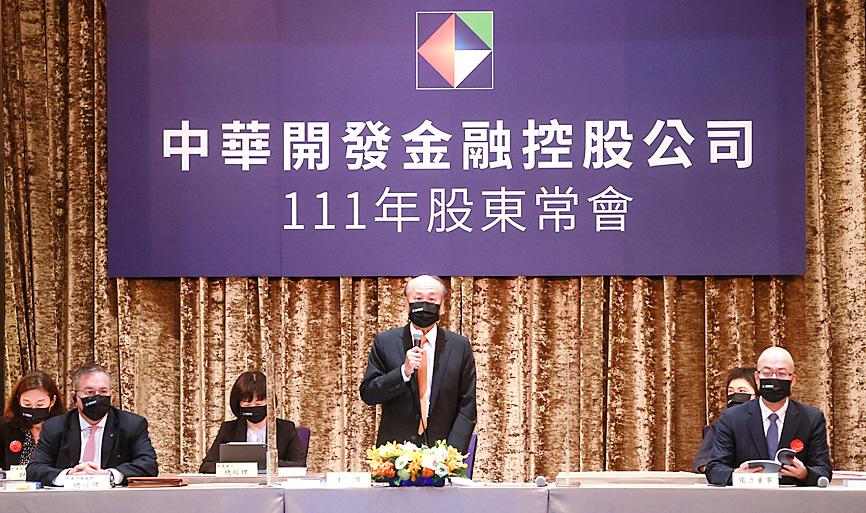The Financial Supervisory Commission (FSC) yesterday fined China Development Financial Holding Corp (中華開發金控) NT$20 million (US$666,756) and suspended its chairman over poor internal controls.
The company’s management team was found to have given major shareholder Angelo Koo’s (辜仲瑩) secretary inside information about the conglomerate’s banking, insurance and securities units from October 2020 to October last year, Banking Bureau Director-General Sherri Chuang (莊琇媛) said.
The data also included company plans to acquire China Life Insurance Co (中國人壽), employees’ performance assessment and payroll information, Chuang said.

Photo courtesy of China Development Financial Holding Corp
The commission said its investigation did not show that Koo made copies of internal data or took actions based on the information, but the possibility cannot be ruled out.
“As major shareholders hold significant control over a company, we do not bar them from knowing the companies’ business or obtaining information, but they should get the information from their representatives on the board, rather than directly from management,” Chuang said.
It is against the principles of corporate governance for management reports to be given directly to major shareholders, she added.
Chuang said company management gave internal information to Sherie Chiu (邱德馨) and Yu Shan-jung (余珊蓉), aides of Koo who were not eligible to receive such information.
The commission also suspended chairman Chang Chia-juch (張家祝) for six months for his failure to supervise the company, and cut general manager Stefano Paolo Bertamini’s monthly salary by 30 percent for three months, it said.
Chang has served as chairman for almost six years, while Bertamini has been a general manager for about a year, Chuang said.
Koo is chairman of CDIB Capital Group (中華開發資本), the company’s investment unit, where Yu is executive vice president, Chuang said, adding that Chiu does not hold a position there.
As CDIB is an investment company, the commission would not suspend Koo, but China Development Financial would seek compensation from the three, she said.
The company is required to submit a plan to improve its internal controls, she added.
The commission yesterday also fined China Life Insurance NT$6 million and KGI Securities Ltd (凱基證券) NT$2.4 million for poor internal controls.

IN THE AIR: While most companies said they were committed to North American operations, some added that production and costs would depend on the outcome of a US trade probe Leading local contract electronics makers Wistron Corp (緯創), Quanta Computer Inc (廣達), Inventec Corp (英業達) and Compal Electronics Inc (仁寶) are to maintain their North American expansion plans, despite Washington’s 20 percent tariff on Taiwanese goods. Wistron said it has long maintained a presence in the US, while distributing production across Taiwan, North America, Southeast Asia and Europe. The company is in talks with customers to align capacity with their site preferences, a company official told the Taipei Times by telephone on Friday. The company is still in talks with clients over who would bear the tariff costs, with the outcome pending further

WEAKER ACTIVITY: The sharpest deterioration was seen in the electronics and optical components sector, with the production index falling 13.2 points to 44.5 Taiwan’s manufacturing sector last month contracted for a second consecutive month, with the purchasing managers’ index (PMI) slipping to 48, reflecting ongoing caution over trade uncertainties, the Chung-Hua Institution for Economic Research (CIER, 中華經濟研究院) said yesterday. The decline reflects growing caution among companies amid uncertainty surrounding US tariffs, semiconductor duties and automotive import levies, and it is also likely linked to fading front-loading activity, CIER president Lien Hsien-ming (連賢明) said. “Some clients have started shifting orders to Southeast Asian countries where tariff regimes are already clear,” Lien told a news conference. Firms across the supply chain are also lowering stock levels to mitigate

NEGOTIATIONS: Semiconductors play an outsized role in Taiwan’s industrial and economic development and are a major driver of the Taiwan-US trade imbalance With US President Donald Trump threatening to impose tariffs on semiconductors, Taiwan is expected to face a significant challenge, as information and communications technology (ICT) products account for more than 70 percent of its exports to the US, Chung-Hua Institution for Economic Research (CIER, 中華經濟研究院) president Lien Hsien-ming (連賢明) said on Friday. Compared with other countries, semiconductors play a disproportionately large role in Taiwan’s industrial and economic development, Lien said. As the sixth-largest contributor to the US trade deficit, Taiwan recorded a US$73.9 billion trade surplus with the US last year — up from US$47.8 billion in 2023 — driven by strong

RESHAPING COMMERCE: Major industrialized economies accepted 15 percent duties on their products, while charges on items from Mexico, Canada and China are even bigger US President Donald Trump has unveiled a slew of new tariffs that boosted the average US rate on goods from across the world, forging ahead with his turbulent effort to reshape international commerce. The baseline rates for many trading partners remain unchanged at 10 percent from the duties Trump imposed in April, easing the worst fears of investors after the president had previously said they could double. Yet his move to raise tariffs on some Canadian goods to 35 percent threatens to inject fresh tensions into an already strained relationship, while nations such as Switzerland and New Zealand also saw increased